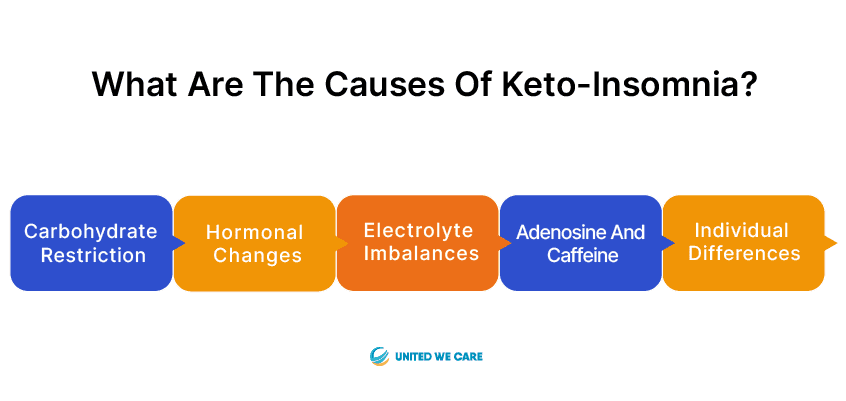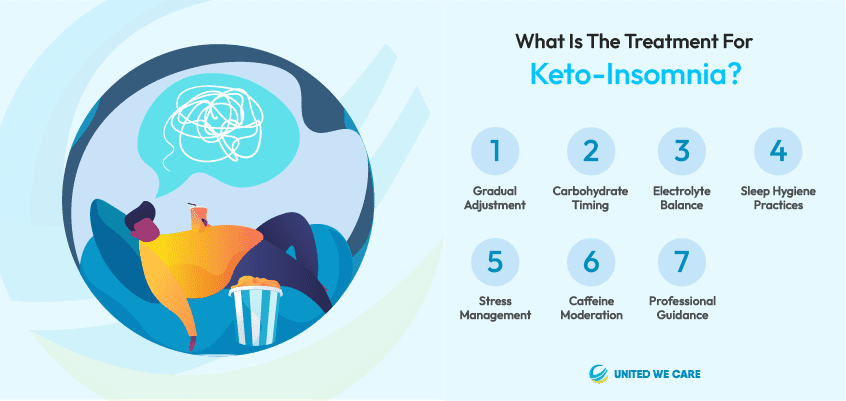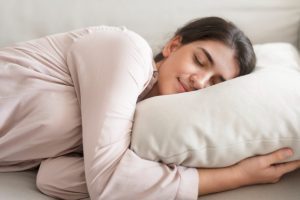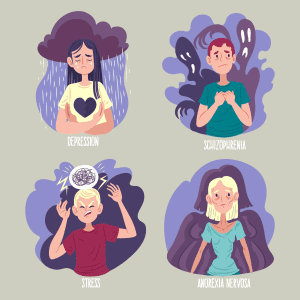Introduction
Have you ever tried any sort of diet? One of the most famous diets these days is the ketogenic or keto diet. But did you know that having this low-carbohydrate diet can cause you to have sleepless nights? While it’s not something that everyone following the diet would go through, a low-carb diet can make you feel hungrier at night. these hunger pangs can cause you to go through a sleep disorder called ‘Insomnia.’ In this article, let’s find out what are the causes and symptoms and how you can overcome this insomnia caused by your diet plan.
“One cannot think well, love well, sleep well if one has not dined well.” – Virginia Woolf [1]
What is Keto-Insomnia?
Have you experienced a time when you were hungry at night but still decided to go. to sleep? Were you actually able to sleep then, or did you just get up to eat something?
One of the most famous diets is ketogenic or keto diet. The diet was originally designed for children in the 1920s who were going through epilepsy. Doctors believed that this diet could help them manage seizure attacks.
In the keto diet, you need to have a low-carbohydrate-based and high-fat-based diet, which means you cannot have bread, potatoes, milk, etc., but you can have fish, egg, bacon, etc. This sort of diet can have an impact on your serotonin levels, which are chemicals released by your body that your nerves use to carry messages to the brain and all the muscles in your body.
In fact, many people found keto-friendly substitutes for even junk food. I remember a friend of mine would have cauliflower rice and pizza, which is basically that you pulse or finely chop cauliflower. As tasty as the food gets, you can give yourself some significant issues, even though many people have seen great results and face no difficulties at all.
One of the major side effects of the keto diet is keto-insomnia. Due to your keto diet, you may get hungry at night, and because you cannot eat anything at that time, you end up staying awake the whole night. Over a period of time, this sleeplessness or lack of restful sleep can convert into a sleep disorder called ‘insomnia,’ where you go days before having any sleep at all [2] [3].
What are the Causes of Keto-Insomnia?
Let’s understand why you may have a disturbed sleep while you’re on a keto diet [4]:

- Carbohydrate Restriction: When you are following a keto diet, you are asked to reduce the amount of carbohydrates in your food intake. Now, carbs are very important to regulate serotonin, a chemical in the body that helps in managing your sleep. So if you have a low-carb diet, your serotonin levels can get messed up, and you can have severely disturbed sleep.
- Hormonal Changes: Your keto diet can make changes in your hormones, which otherwise help you to perform your daily tasks. These hormones can be insulin, which is used to turn food into energy; cortisol, which helps your body to use glucose and increase energy levels; or melatonin, which helps you sleep soundly at night. All these hormones, at different levels, are necessary for you to sleep well. Because your keto diet makes changes in them, you can have difficulty falling or staying asleep.
- Electrolyte Imbalances: We have grown up understanding that a balanced diet is very important for us. However, when you have a keto diet, in the initial stages, you may lose certain minerals, like magnesium, potassium, sodium, etc. These minerals or electrolytes are important for sound sleep.
- Adenosine and Caffeine: You may come across dieticians who recommend having black coffee as a part of your keto diet. Adenosine is a chemical that promotes sleep, which can be affected by your caffeine intake. These changes in your caffeine consumption can cause sleep patterns to change as well.
- Individual Differences: Not every diet is for everyone as your body may react differently than, let’s say, your friend. So if you combine your genetics, existing sleep issues, stress levels, etc., and combine it with the keto diet, you may face issues.
What are the Symptoms of Keto-Insomnia?
By now, I’m sure you are curious to know how you can identify if you have insomnia related to your keto diet or not. Answer the following questions [5]:
- Do you take time to fall asleep even though you feel tired and sleepy?
- Do you wake up several times or feel restless during your sleep?
- Do you wake up feeling tired and not well-rested, even though you slept for 6 to 8 hours?
- Do you feel sleepy during the day and have very little energy to do anything?
- Do you get irritated and angry easily?
- Do you find it difficult to focus and concentrate on any tasks?
- Do you feel you might be facing symptoms of anxiety or depression?
- Have you started facing issues remembering information?
If your answer to any of these questions is yes, then you could be experiencing insomnia. And, if it all started after you started your keto diet, then there is a high chance that it’s keto insomnia.
What is the Treatment for Keto-Insomnia?
Like most issues in the world, you can adjust to your keto diet and experience better sleeping patterns. Here are some strategies you can implement [6]:

- Gradual Adjustment: When you start the diet, make sure to start slowly rather than going all out. If you do that, you can shock your body, and all your systems can react adversely, causing you to have sleep issues. Go one step at a time, irrespective of what someone tells you. In fact, gradual steps can give you long-lasting results.
- Carbohydrate Timing: Instead of eating carbohydrates during the day, time it in such a way that you eat them closer to bedtime. That way, your serotonin levels will not be impacted, and you will have a sound sleep.
- Electrolyte Balance: Since initially, you might face a sudden reduction in your magnesium, potassium, and sodium levels, you can probably substitute them through your diet or have supplements. Either way, consult your doctor and your dietician before you consume any supplements. If your electrolyte levels don’t get impacted, neither will your sleep.
- Sleep Hygiene Practices: In general, you make sure I get enough sleep. I would make sure to shut off my TV, laptop, and phone at least 30 minutes before sleeping. I would prefer taking a warm bath or reading to allow my body and mind to understand that it’s time to drift to the land of dreams. Even you can try doing that if you face keto-insomnia.
- Stress Management: I even practiced techniques that could help me manage my stress levels. I added meditation and breathing exercises to my routine. You can even add journaling if you like to pen down your thoughts. That way, you would be able to get rid of the stress. A stress-free mind is a happy mind, which can help you sleep better. So give it a try, even if you consume a keto diet.
- Caffeine Moderation: Since caffeine can take away your sleep, make sure not to have a cup closer to bedtime. That way, when you feel tired, you would genuinely want to sleep and be able to do that easily.
- Professional Guidance: Finally, if nothing works, please consult a professional. There are sleep specialists who can help, or you can even consult a licensed dietician. A doctor can give you medicines to help you with your sleep issues for a while, and a dietician can help you manage the effects by making changes in your diet.
Conclusion
Taking care of your diet and sleep are both extremely important for good health. But, if one starts impacting the other badly, then there is something that needs to be done. Keto-insomnia is one such example. When you have low-carb foods, as suggested by the ketogenic diet, you can certainly lose weight, but it also impacts your sleep. However, like everything, we can resolve everything through supplements, good sleep hygiene, professional help, etc.
If you face any sleep-related concerns, contact our expert counselors or explore more content at United We Care! At United We Care, a team of wellness and mental health experts will guide you with the best methods for your well-being. Additionally, you can join the Sleep Wellness Program and Advanced Wellness Program for Sleep Disorders at United We Care.
References
[1]“A quote from A Room of One’s Own.” https://www.goodreads.com/quotes/1860-one-cannot-think-well-love-well-sleep-well-if-one
[2] “Keto insomnia: How the Ketogenic diet may affect your quality of sleep | The Times of India,” The Times of India, Jan. 21, 2021. https://timesofindia.indiatimes.com/life-style/health-fitness/diet/keto-insomnia-how-the-ketogenic-diet-may-affect-your-quality-of-sleep/photostory/80370033.cms
[3] M. Sisson, “Is Keto Insomnia a Common Problem? | Mark’s Daily Apple,” Mark’s Daily Apple, Oct. 30, 2019. https://www.marksdailyapple.com/keto-insomnia/
[4] M.-P. St-Onge, A. Mikic, and C. E. Pietrolungo, “Effects of Diet on Sleep Quality,” Advances in Nutrition, vol. 7, no. 5, pp. 938–949, Sep. 2016, doi: 10.3945/an.116.012336.
[5] “Keto Insomnia,” Hydrant. https://www.drinkhydrant.com/blogs/news/keto-insomnia
[6] H. P. Ltd. and H. staff, “5 Tips To Prevent And Manage Keto Insomnia,” HealthMatch. https://healthmatch.io/insomnia/how-to-prevent-keto-insomnia









